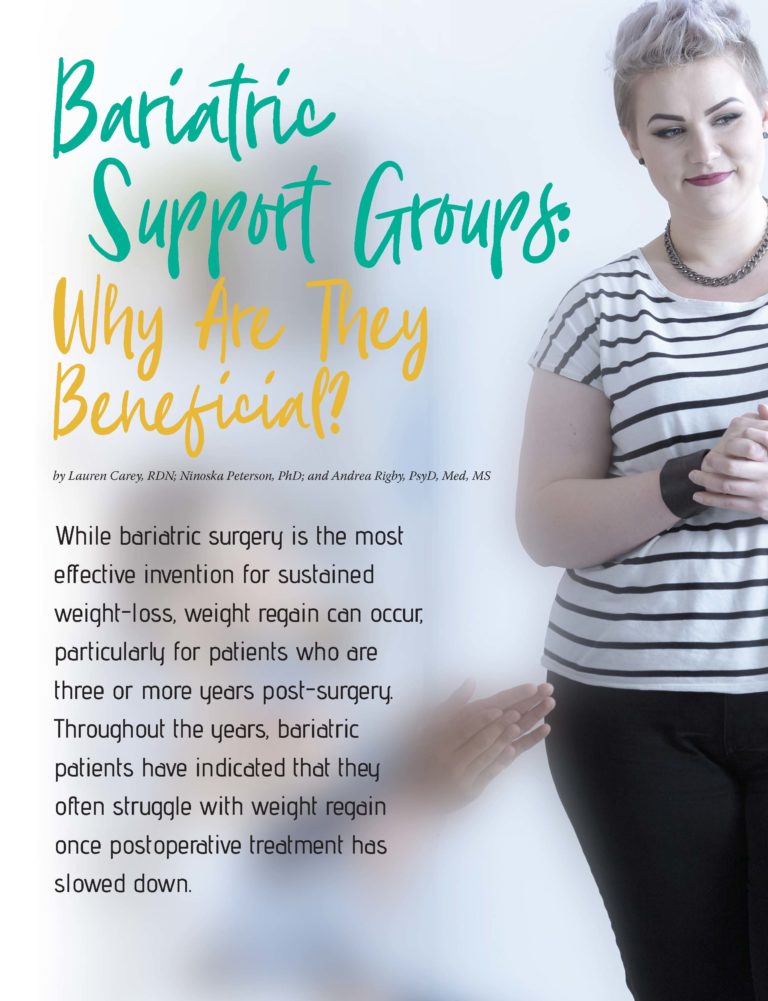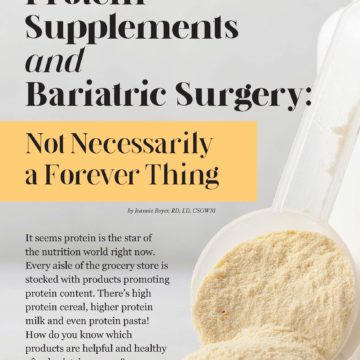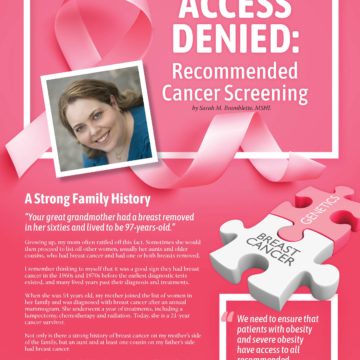Bariatric Support Groups: Why Are They Beneficial?


by Lauren Carey, RDN; Ninoska Peterson, PhD; and Andrea Rigby, PsyD, Med, MS
Spring 2022
While bariatric surgery is the most effective invention for sustained weight-loss, weight regain can occur, particularly for patients who are three or more years post-surgery. Throughout the years, bariatric patients have indicated that they often struggle with weight regain once postoperative treatment has slowed down.
Why Should Bariatric Surgery Patients Go to a Support Group?
Bariatric surgery patients can benefit from participating in bariatric support groups before and after their surgery. However, postoperative patients may find that their overall motivation for weight management and support group attendance lessens over time. Attendance at support groups may help patients renew their commitment to leading a healthy lifestyle and re-engage with their bariatric team.
Benefits of Support Groups
Previous research points to the benefits of support group attendance not only for weight-loss, but also for long-term maintenance of weight management behaviors. One study showed that patients who attended support groups achieved more long-term weight-loss following surgery than those who did not attend, with the frequency of attendance associated with greater weight-loss.
These researchers found a “dose effect” in patients who attended five or more meetings the first year after surgery and lost more weight. Another study showed that adolescent patients who attended support groups were more likely to attend clinic follow-up visits the year after. As providers of our own support groups, we hear from our patients that support groups provide accountability, encouragement, new knowledge and a safe place to ask questions.
The American Society for Metabolic and Bariatric Surgery (ASMBS) encourages bariatric programs to offer support groups at least every other month. Other forms of support also exist, such as online support groups and informal networks of friends and family who may have had bariatric surgery.
All forms of support can be helpful. However, bariatric program support groups provide timely, factual and evidence-based information for patients. Despite all these benefits, the majority of bariatric patients do not attend support groups offered by their program. In one study using a telephone survey of 118 patients, participants were asked to list the reasons for support group non-attendance. The top reasons were being too busy (25%) and feeling intimidated (21%).
Find a Support Group that Works for You!
In today’s world, more and more patients seek online support groups to get answers, ideas and stay on track. The issue is that many groups, especially Facebook groups, for example, are not moderated and/or run by qualified individuals. This can lead to the circulation of false information and expectations.
Try to stay connected with your program’s support groups and social media platforms by aiming to attend virtual or in-person meetings. If your program does not provide any of these support groups, try a reputable online support group such as the one from Unjury.com. The site offers multiple groups per month that are facilitated by qualified professionals.
Once you decide to seek support, how do you get the most out of your support group experience? Here are some tips:
- Stay connected to your program and commit to attending at least two to three times yearly, preferably five or more. Some attendance is better than no attendance! You may be anxious asking for help down the road if you have not followed up or attended a support group for several years.
- Use a support group as a way to check your progress and self-monitor any tendency to relapse into previous behaviors that could lead to weight regain. Listening to others who have worked through similar challenges is often reassuring. You may pick up a tip from someone else that could reinvigorate your commitment to staying on track.
- Prepare to engage in the group session by writing down one or two questions about the topic. By tapping into your curiosity prior to the group meeting, you will be more likely to listen and participate fully in the group.
- Think mindfully before responding to others’ comments and consider how you can lend constructive feedback and support to other group participants. Helping others can be a mood booster and a reminder to follow through with your own behaviors.
- If weight regain has become an issue, try not to let feelings of shame or embarrassment prevent you from reaching out for support. Attending a support group can be a first step toward re-establishing care with your bariatric team.
- Be aware if attendance or participation is triggering. For example, if you are participating in online groups, assess if seeing others’ weight-loss or pictures makes you draw unfair comparisons or worry that you aren’t losing enough weight. If your online support group isn’t helpful, it’s okay to take a break or find a new group altogether.
- Be aware of the accuracy of the content on social media support groups. One study of online support groups found that half of the posts contained inaccurate or ambiguous information regarding nutrition. ASMBS-accredited programs are required to have a licensed professional who is offering and running the sessions. Social media groups do not have this requirement.
- Support groups are not there for you to ask for or give personalized medical advice. Set realistic expectations that the support group may not answer every question or address specific issues you may have. You should still schedule individual appointments with your bariatric team’s dietitians, doctors and psychologists in addition to attending a support group.
- Provide suggestions to the support group leader about topics you are interested in learning about. An ideal support group will try to balance what the patients want to know with what the treatment team wants the patients to know. Look at the following table for some suggestions.
- Support groups should not be a place for someone to try selling you a particular product. Always check with your bariatric team about recommendations you get from social media support groups.
Common Support Group Topics
Speakers: Medical professionals (Surgeons, Physicians, Nurses, Physician’s Assistants)
Discussion Topics:
- Basics of Obesity Treatment
- Ask an Expert
- Medications for Weight Gain after Bariatric Surgery
- Bariatric Surgery in the News
- Plastic Surgery after Bariatric Surgery
- Pregnancy after Bariatric Surgery
Speakers: Registered Dietitians
Discussion Topics:
- Recipe Remix
- Tips for Staying Hydrated
- Vitamins and Supplements
- Staying on Track on Vacation
- Holiday Eating
- Grocery Shopping Tips and Tricks
- Ways to Increase Protein
- Potlucks and Recipe Swaps
- Cooking Demonstrations
Speakers: Behavioral Health Professionals (Psychologists, Social Workers, Psychiatric Nurse Practitioners, Psychiatrists)
Discussion Topics:
- Body Image Changes
- Navigating Relationships
- Emotional Eating
- Stress Management
- Dealing with Addictive Behaviors
- Self-Sabotage
- Measuring Success and Non-Scale Victories
Speakers: Other/Combination of Speakers
Discussion Topics:
- Exercise after Bariatric Surgery
- Clothing Swap
- Fashion Shows
- Patient Testimonials
Conclusion
Remember that bariatric surgery is just a tool, but it’s also a commitment you are making to yourself for the long run. Ups and downs are all part of the journey. By attending support groups, you’ll find validation for your own thoughts and feelings. Knowing that other people have experienced exactly what you have/are going through helps to normalize your journey and hopefully lessen any feelings of shame, embarrassment or failure. People typically leave support groups feeling empowered, motivated and positive—all things needed to stay consistent with healthy habits!
About the Authors:
Lauren Carey, RDN, has been a Registered Dietitian/Nutritionist for 13 years. She is the owner of LBS Nutrition LLC, a nutrition & wellness practice in Central New Jersey. Since the beginning of her career, Lauren has been extensively involved in helping patients pre and post-bariatric surgery and currently serves as Chair of the Integrated Health Support Group Committee through the American Society of Metabolic and Bariatric Surgery (ASMBS).
Ninoska Peterson, PhD, is a staff psychologist with the Cleveland Clinic’s Bariatric & Metabolic Institute. She conducts evaluations and individual and group treatment for patients seeking surgical and non-surgical weight management. She has been coordinating and facilitating support groups for the past few years.
Andrea Rigsby, PsyD, Med, MS, is the dedicated psychologist for the Penn State Health Surgical Weight Loss Program. She is involved in clinical care of bariatric and weight management patients in addition to research on issues related to bariatric surgery, including food security, weight bias internalization and dietary quality.
by Sarah Muntel, RD Spring 2024 Spring has sprung, bringing sunnier and warmer days! For many, this…
Read Articleby Robyn Pashby, PhD Winter 2024 “No one is ever going to date you if you don’t…
Read Articleby Michelle “Shelly” Vicari Winter 2024 Winter has arrived! Don’t allow the chilly and damp weather to…
Read Article








